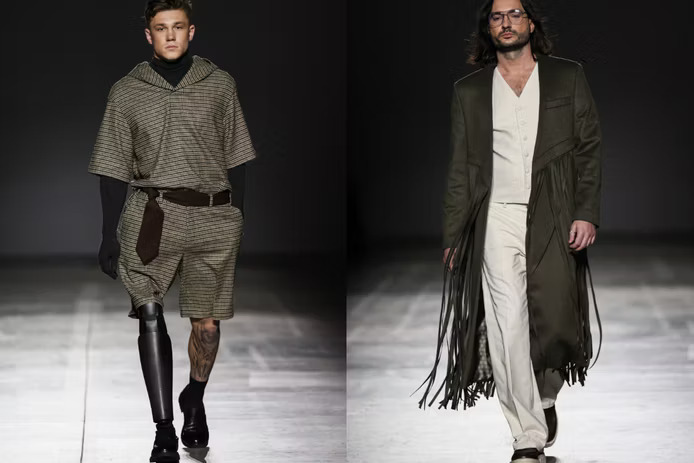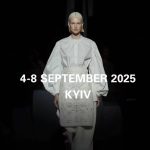On the runways of Ukrainian Fashion Week—where fashion and politics often intersect—designers Andriy Moskin and Andreas Bilous of the label Andreas Moskin have turned their artistry into a medium of social healing. In recent seasons, their shows have featured war veterans with prosthetic limbs walking beside professional models, creating a powerful statement that goes beyond aesthetics. Their designs blend refined tailoring with adaptive functionality, showcasing fashion as a reflection of resilience and human dignity.
In September 2024, as Ukrainian Fashion Week returned to Kyiv for the first time since the full-scale invasion, designers Moskin and Bilous delivered a show that captured global attention. Their collection featured bohemian touches—folk-inspired shirts, asymmetrical embroidery, and tasselled linen—evoking the spirit of Ukraine’s 1960s and ’70s poetic cinema. But it was the presence of war veterans, walking the runway with prosthetics, that made the strongest impact. Speaking to AP News, Bilous shared, “We wanted to show that Ukrainian fashion is evolving with society—embracing those who’ve survived war with amputations. They can still be stylish, and they deserve love, respect, and to be seen as a vital part of our community.”
For the Fall 2025 season, Andreas Moskin’s “Executed Renaissance” collection carried forward its message of adaptation—this time through inventive structure. The designs included elongated tweed jackets and deconstructed suits in deep crimson and khaki, reflecting both the cultural scars of the mid-20th century and a renewed spirit of independence. The true breakthrough, however, was technical: garments with removable sleeves via hidden zippers, and inner-seam openings on trousers—seamlessly designed to accommodate prosthetic limbs without sacrificing style or sophistication.
As a viewer, it’s hard not to draw a connection between tailoring and healing. Where a suit once stood solely for refinement, it now becomes a tool of support—bridging vulnerability and grace.
Looking ahead to September 2025, Ukrainian Fashion Week will once again spotlight Moskin and Bilous, who are continuing their collaboration with war veterans in preparation for the Spring/Summer 2026 collection. While the details remain under wraps, insiders confirm that rehearsals have already begun—underscoring that this is not mere performance, but a profoundly human pursuit: fashion as restoration, design as inclusion.
Adaptive fashion is emerging as one of Ukraine’s most moving contributions to the global industry—practical, politically resonant, and deeply considered. Through their work, Moskin and Bilous are not just designing clothes—they are crafting dignity, amplifying resilience, and reshaping what fashion means.
What this means for fashion’s broader narrative
The delicate power of adaptive menswear showcased in Kyiv marks a shift from fashion’s traditional fixation on novelty for its own sake. In this context, innovation becomes both ethical and artistic—where functionality is not an afterthought, but an integral part of the design itself.



